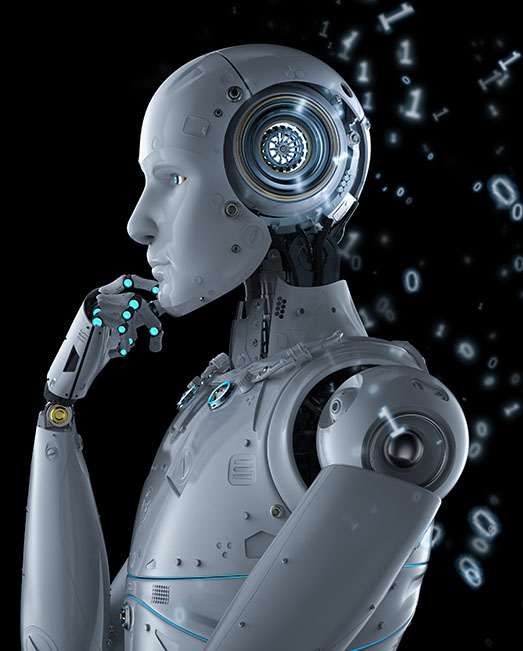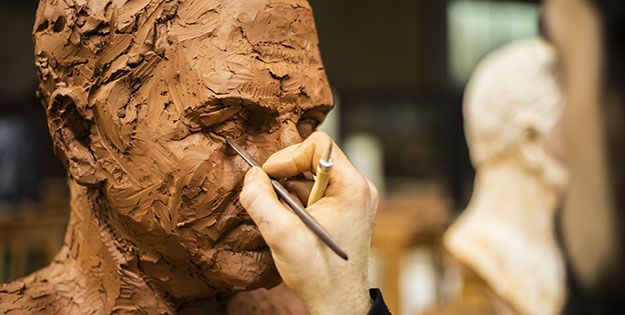Career
Copyright@ Australian Catholic University 1998-2026 | ABN 15 050 192 660 CRICOS registered provider: 00004G | PRV12008
Copyright@ Australian Catholic University 1998-2026 | ABN 15 050 192 660 CRICOS registered provider: 00004G | PRV12008

The jobs, they are a-changin’. The so-called ‘future of work’ may have seemed far off and distant in the pre-COVID world, but the pandemic has hastened our march towards it, bringing forward emerging technologies and accelerating trends that were already in play.
The rise of remote working, enhanced connectivity and a focus on employee wellbeing was indeed fast-tracked by the pandemic, as was the adoption of automation and other digitised business processes.
For some, the move towards a tech-dominated workforce is a scary thought. For decades experts have warned us that the robots are coming for our jobs.
“It’s quite simple,” futurist Anders Sandberg told Andrés Oppenheimer in The Robots Are Coming: The Future of Jobs in the Age of Automation. “If your job can be easily explained, it can be automated. If it can’t, it won’t.”
Thankfully, many others foresee a brighter jobs future.
In his popular essay, ‘Why robots will not decimate human jobs’, social scientist Bob Gordon argued that, despite the many forecasts that automation would spell employment disaster for current and future generations, most of the hype about robots is unwarranted.
“I play a game called ‘find the robot’,” he wrote. “In my daily strolls in and out of supermarkets, restaurants, doctor and dentist offices, my nearby hospital, offices in my own university, and the vast amount of employment involving elementary and secondary teachers, personal trainers and old age caretakers, I have yet to find a robot.”

This suggests that jobs uniquely suited to humans — teaching, nursing, childcare, social work and other caring professions – could be more in-demand in the years to come.
One can find support for this theory in the ‘Future of Jobs’ report, released by the World Economic Forum (WEF) in October 2020, which highlights “the continuing importance of human interaction in the new economy through roles in the care economy”.
The WEF report identified the top skills employers see as rising in prominence, including critical thinking, problem-solving, resilience, flexibility, and “an aptitude for understanding and being comfortable working with different types of people from different backgrounds”.
These human skills, which are common amongst graduates in the humanities and social sciences, aren’t only critical in caring roles — they are also highly sought-after in emerging professions like data science and other information technology careers.
In 2013, tech giant Google revealed that STEM expertise came dead last in the list of skills held by its star employees. More important were traits like empathy and the ability to solve problems and make connections.
The company promptly adjusted its hiring practices to include more graduates from a broader range of disciplines. In doing so, they were recognising a fundamental truth: true innovation comes through the blending of ‘hard’ and ‘soft’ skills.
ACU and many other universities now teach non-technical skills to students, even those in IT and science disciplines, in order to better prepare them for the workforce.
Most careers of the future will bank on these skills, according to research by consulting firm Deloitte, whose report ‘Building the Lucky Country’ found that human skills will be crucial in two-thirds of jobs created by 2030.
“There is clearly some anxiety about the future of work … we say there’s no need to be scared,” said Deloitte’s Richard Deutsch. “People and their unique interpersonal and creative skills will be central to the future of work, and how we structure this future and prepare our workers will say a lot about us as a society.”
Another positive of this diverse approach to learning and working is that you don’t keep all your eggs in one basket.
The graduates of tomorrow are likely to have 17 jobs in five different careers throughout their working life, and those who stand ready to adapt will be the most shielded from unforeseen changes.
“If you want to prepare for a future of work, you need to be ready to do more than one thing,” says writer Benjamin Watkins “You need to diversify your work. It will be your backup plan, your doors of opportunity if the economy ever decides to shut you out.”
It is undoubtedly true that automation is taking many of our jobs.
The World Economic Forum estimates that by 2025, “85 million jobs may be displaced by a shift in the division of labour between humans and machines”.
The good news is that those jobs will be replaced with new ones (and many more of them), with the WEF predicting that 97 million new roles may emerge.
Some of these careers of the future will be in digital technology – data detectives, masters of edge computing, AI development managers and the like – but many others won’t.
Exercise scientists might take on roles as fitness commitment counsellors. Accounting and finance graduates could go into business as financial wellness coaches. Philosophers and ethicists might work as algorithm bias auditors or ethical sourcing officers.

Moreover, companies will find jobs that haven’t yet been imagined, in order to tap into their human capital.
As the Future of Jobs report declares: “One of the most valuable assets of any economy or company is its human capital – the skills, capabilities and innovation of its citizens”.
Employees with a more diverse range of knowledge, who can display empathy and leadership and can work well with others, will be better able to react to the challenges that arise. And those challenges won’t be met without human collaboration and creativity.
“A technological shift is in progress that will change the rules of innovation,” wrote Harvard academic Vivek Wadwah, “To create the amazing future that technology is enabling, we need our musicians and artists working hand in hand with our engineers.”
Others take that even further, suggesting that technology allows us to collaborate not only with each other, but also with machines.
“By redefining how we want to work, we can create new jobs for a future in which humans and machines can complement each other,” wrote Andrew Charlton and Jim Chalmers in The Monthly.
“While the robots toil away on the routine and physical tasks, humans can focus on interpersonal, creative and problem-solving tasks.”
Rather than worrying about the future of work, young Australians should therefore embrace our tech-enabled future, because machines will make human work more ‘human’.
The future of work might not be so scary after all.
So, what can students and graduates do to secure their place in the emerging world of work?
Along with the development of human skills, experts commonly identify three further elements employees need to focus on.
1. Upskilling and reskilling: As the jobs we do will change, so will the skills we need to succeed in them. Employees will need to continue to learn new skills well after they graduate from university. Those who are proactive about their own personal and professional development, who take courses and find ways to pick up new skills, will be more able to adapt and prosper. Whether it’s a short course, a bachelor's degree or postgraduate study, continuous skill development is key to success in the future world of work.
2. Digital literacy: Most university undergrads won’t remember a time without the internet. These so-called ‘digital natives’ have been raised in a constantly connected world, and often have intuitive ways of using technology to solve real-world problems. However, according to the Foundation for Young Australians, some young people have surprisingly low digital literacy, and this is a problem that needs addressing if they’re to be ready for the future. For some, that might mean learning how program or code. Others will simply need to gain an understanding of how to use technology to communicate effectively. In both cases, digital literacy will be among the most important tools for those entering the workforce in the years ahead.
3. Flexibility and agility: When it comes to the future of jobs, there’s no crystal ball. Nobody knows exactly how it will look. But one thing’s for sure: the future of work is flexible. This flexibility runs both ways: employers will need to offer their workers more freedom over when, where and how they fulfil their duties; and, on the other hand, employees who can respond effectively to changing business needs will have ongoing success. Those who are flexible, curious and innovative, who can see the possibilities where others don’t, will be the ones most likely to handle rapid change.
Keen to secure your future through study at ACU? Explore the options.
Copyright@ Australian Catholic University 1998-2026 | ABN 15 050 192 660 CRICOS registered provider: 00004G | PRV12008